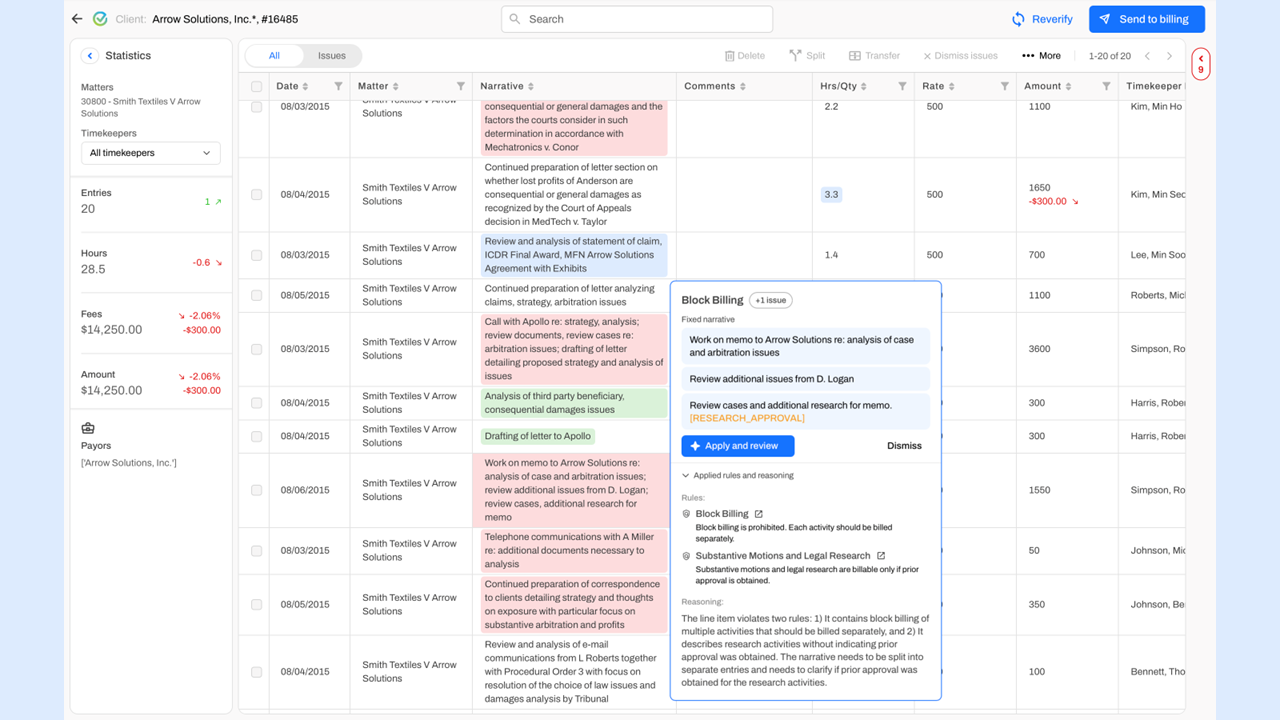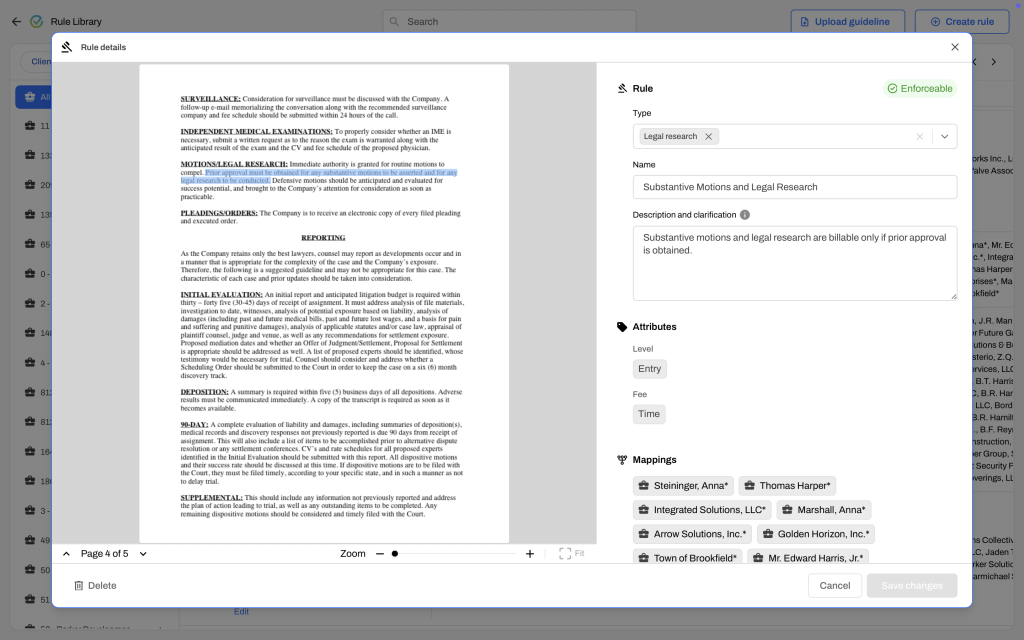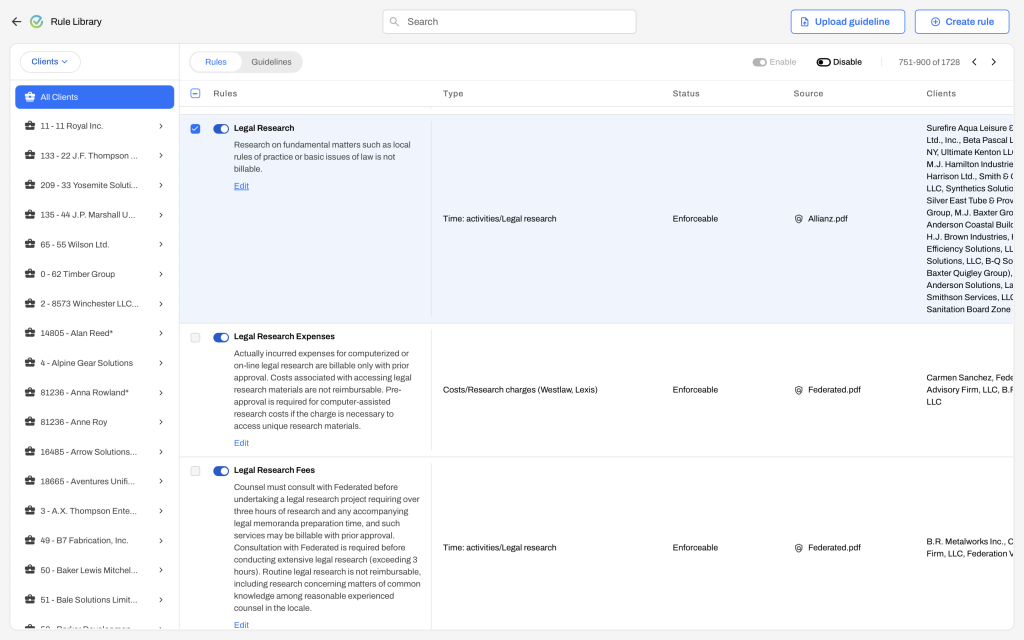Last year was a big one for the company formerly known as ZERO. Not only did it rebrand under the new name Hercules AI, but it also raised $26 million in Series B funding and launched a new AI-powered pre-bill review platform, Verify, that it says can detect up to 50% of billing compliance issues before they result in client deductions.
Along with all that, HerculesAI is also making a Herculean promise to its Verify customers: It is putting guarantees in their contracts that if they do not reach a specified level of return on investment, then they owe nothing.
CEO and cofounder Alex Babin says this ROI guarantee is a first in the legal tech industry. I can neither confirm nor disprove that claim, but my quick research was not able to find anything else like it.
Verify combines multiple proprietary large language models to automate the detection and correction of billing compliance issues, all operating entirely within law firms’ security perimeters rather than relying on external AI services.
The system aims to help larger law firms address a growing challenge in legal billing, as they face increasing pressure from clients over billing compliance and struggle with rising deduction rates, which, according to Babin, are increasing by approximately 10% year over year.
Rebranding to HerculesAI
You may know of HerculesAI by its former name, ZERO, which launched in 2017 and developed a mobile app that automatically captured lawyers’ billable time spent working on email on their mobile phones. (In 2020, I wrote about a “lite” version of this app ZERO released for smaller firms.)
In 2021, it launched a desktop product, Apollo, that automatically captured time spent on billable work on a desktop device and integrated those time entries into the lawyer’s billing platform. It continues to offer both AI-powered time capture and AI-powered email classification and filing.
But as a company that says it was working with proprietary large language models well before ChatGPT ever came on the scene, HerculesAI began to focus more on developing multi-agent systems able to perform a variety of core enterprise data-management tasks, spanning extraction, transformation and verification.
The Hercules name originated as the company’s internal designation for its AI engine, chosen because, as Babin explains, “Hercules did all those great labors and unthinkable and imaginable things that everyone else thought impossible.”
Eventually, the company decided to adopt this internal code name as its public brand, seeing it as a better reflection of its capabilities and vision compared to the more generic ZERO.
“ZERO is a good name but you cannot be more generic than ZERO – it’s like absolutely nothing in terms of the brand value,” Babin told me. The new name resonates with a broader audience, he believes. “Everyone loves Hercules. Everyone grew up on a Hercules movie from Disney.”
Reducing the WIP-to-Cash Cycle
Verify is its latest product to emerge from this development. Unlike traditional pre-bill review products, Verify introduces a multi-stage approach to billing compliance that begins before the pre-bill generation phase. The platform allows for compliance review at various stages: during time capture, after time entry submission, and during the traditional pre-bill review process.
“Our goal is to reduce the WIP-to-cash cycle and specifically reduce the number of days it takes from pre-bill generation to sending out the invoice, which some law firms are saying takes them 50, 60 days today,” Mariam Hambarchyan, the company’s director of product management, told me during a demonstration. “Our goal is to reduce that to under 30 days.”
Hambarchyan emphasized the company’s “AI-first” approach, distinguishing itself from competitors by using multiple specialized AI models it has been developing in-house since 2019. According to Babin, this differs significantly from solutions that either retrofit AI capabilities onto existing software or rely on general-purpose AI models like OpenAI’s GPT.
“It’s a bigger difference than being just a software with AI sprinkles on top of it or AI icings on top of it,” Babin said. The system employs what Hambarchyan described as “an assembly approach with dozens of models working in tandem” with different specializations and levels of domain expertise.
Key Features
The platform integrates with major financial systems including 3E and Aderant Expert, in both on-premises and cloud deployments. It automatically identifies potential compliance issues in time entries and suggests specific corrections, handling common problems such as block billing, vague narratives, and non-compliant task codes.
A notable feature is the system’s ability to process outside counsel guidelines (OCGs) and internal billing rules without requiring manual rule creation. The AI can extract and interpret billing requirements directly from OCG documents and firm policies, and also learn from historical e-billing data, including rejections and deductions, and then enforce those rules at various levels – from individual matters to firm-wide standards.
Users can apply this AI to their time entries on an ongoing basis or when reviewing pre-bills. Verify shows the issues it detects and suggests fixes to make the bill compliant. Users are free to accept or reject its suggestions, and they can easily view the guideline on which the suggestion is based.
Law Firm Adoption
Hambarchvan said that law firms have been enthusiastic about the product. In one recent client-satisfaction survey, approximately 70% of users indicated they would be “very disappointed” if they could no longer use the product. The benchmark for similar technology products is 40%, she said.
Perhaps most notably, HerculesAI is taking the unusual step of including ROI guarantees in its contracts. “If they do not reach that specific level, they don’t owe anything,” Babin said. “That’s how confident we are.”
Firms are taking various approaches to implementation. Some firms have an internal pre-bill review team and start by deploying Verify to that team, while others have mandated firm-wide adoption from the start.
The platform allows for flexible deployment models, accommodating firms that want to maintain dedicated billing compliance teams as well as those preferring to distribute compliance responsibilities among timekeepers.
The system can be used collaboratively, with multiple reviewers working on the same pre-bills, or delegated entirely to compliance teams.
Still, Babin says many firms have yet to even adopt e-billing, let alone AI compliance review. While certain types of firms, such as those in insurance defense, are close to 100% adoption of e-billing, others are still using paper billing.
But the future is clear, he believes, with adoption of e-billing growing every year.
“The best way to build client trust is to start with the billing process,” Hambarchyan said. “That’s why the most conscientious partners know that the bill is important for them to invest their time on.”
 Robert Ambrogi Blog
Robert Ambrogi Blog

